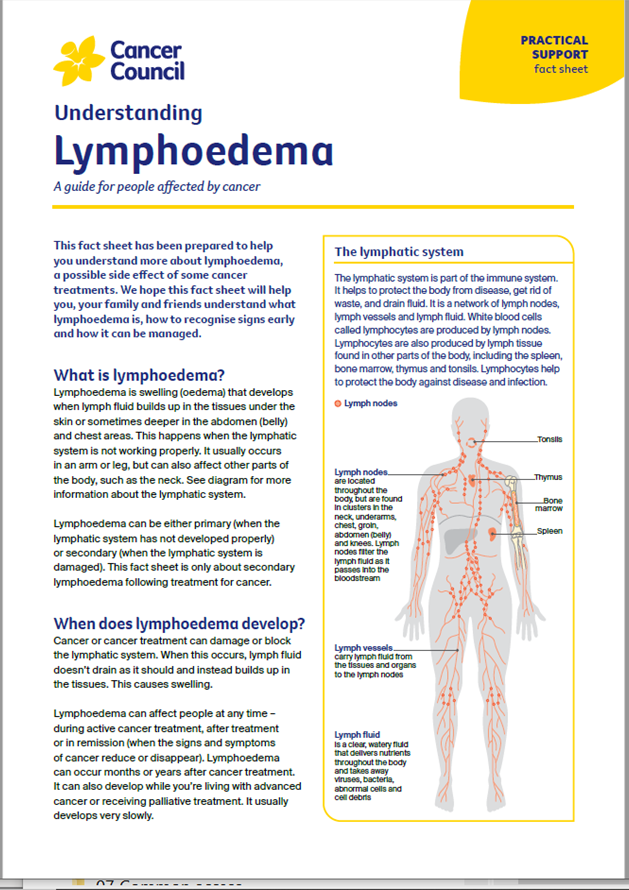- Home
- About Cancer
- Managing side effects
- Lymphoedema
- Coping with lymphoedema
Coping with lymphoedema
Lymphoedema can affect your body and mind, so it’s important to look after your wellbeing.
Having lymphoedema can affect how you feel about yourself (self-esteem) in several ways, including:
| Body image | You may feel self-conscious about the swelling and how you look. Or you may have trouble finding suitable clothes and footwear, which can also affect how you feel about yourself. |
| Sexuality and intimacy | You may lose interest in sex, or you may feel that any visible changes make you less attractive and worry others will reject you. |
| Anxiety and depression | You may feel overwhelmed by the ongoing treatment and by the permanent reminder of having had cancer. |
| Social isolation | You may avoid work and social activities because of concern about how you look or because you find it difficult to move around. |
Give yourself time to get used to any physical changes. You may experience a variety of emotions, including anger, anxiety and resentment. Everyone has their own way of coping with their emotions.
Some people find it helpful to talk with family and friends, while others seek professional help from a counsellor or psychologist. You may find it helpful to join a support group to talk with other people who are dealing with lymphoedema.
Learn more about sexuality, intimacy and cancer and emotions and cancer, or call 13 11 20.
Podcast: Coping with a Cancer Diagnosis
Listen to more of our podcast for people affected by cancer
More resources
A/Prof Louise Koelmeyer, Director, Australian Lymphoedema Education, Research and Treatment (ALERT) Program, and Associate Professor, Macquarie University, NSW; Prof John Boyages AM, Founding Director and Honorary Professor at the ALERT Program, Macquarie University, NSW; Dr Nicola Fearn, Occupational Therapist and Accredited Lymphoedema Therapist, The Lymphoedema Clinic Wollongong, and Senior Research Officer, St Vincent’s Hospital Sydney, NSW; Jennifer Gilbert, Clinical Nurse Consultant – Lymphoedema, Icon Cancer Centre, Chermside, QLD; Megan Howard, Senior Physiotherapist and Lymphoedema Physiotherapist, Peter MacCallum Cancer Centre, VIC; Caitriona Nienaber, 13 11 20 Consultant, Cancer Council WA; Dr Amanda Pigott, Clinical Specialist Occupational Therapy, Princess Alexandra Hospital, QLD; Prof Neil Piller, Director, Lymphoedema Clinical Research Unit, College of Medicine and Public Health, Flinders University, SA, and Patron, Lymphoedema Association of Australia; Ashlynne Pointon, Consumer; Dr Cathie Poliness, Breast Surgeon, Peter MacCallum Cancer Centre, VIC; Tara Redemski, Senior Physiotherapist – Cancer and Blood Disorders, Gold Coast University Hospital, QLD.
View the Cancer Council NSW editorial policy.
View all publications or call 13 11 20 for free printed copies.

